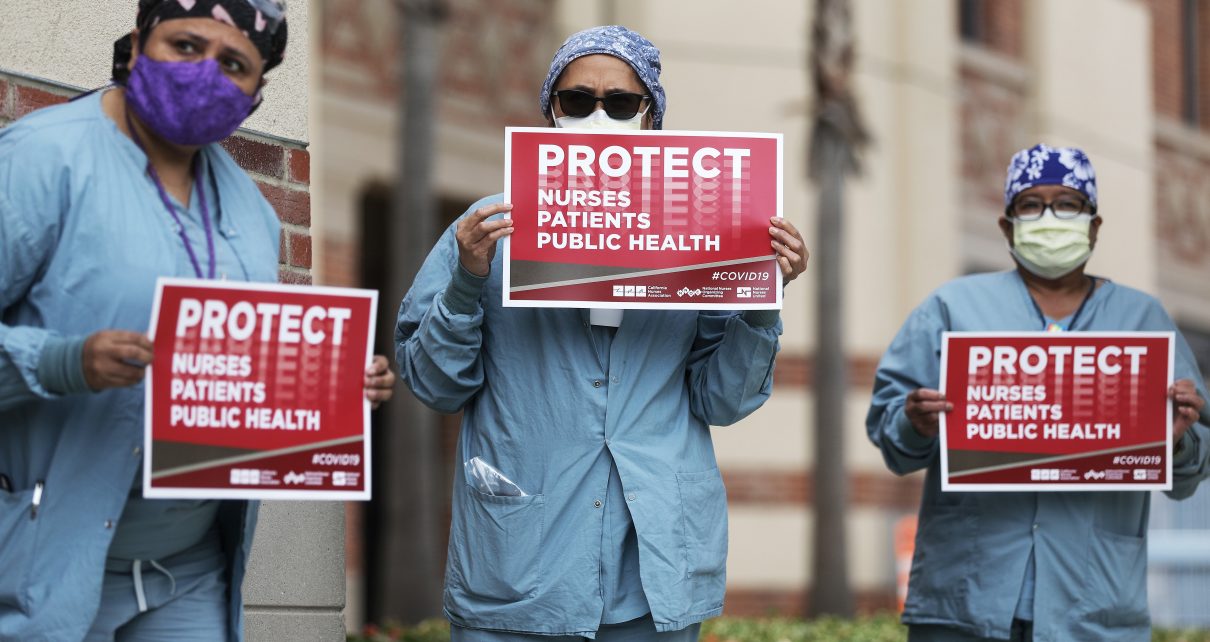Front line health care professionals, particularly nurses, physician assistants and doctors, are experiencing a range of complex emotions during the COVID-19 pandemic. They risk their lives to save others. They place their loved ones at risk because of their exposure. This makes them fearful. They are forced to make hard decisions concerning life and death, and witness and support those patients die alone and often painfully. This makes them sad. This is the state of affairs in a number of hot spots within the United States and around the world. But there is another common emotion they may be experiencing that is less talked about: anger.
Front line workers’ anger stems from potentially morally injurious situations. Moral injury is commonly defined as the strong feelings resulting from violating one’s core moral beliefs. Many scholars focus on the distress resulting from committing acts that go against one’s moral code. However, Jonathan Shay, a U.S. military psychiatrist, originally defined moral injury as betrayal of what is right by leaders in a high-stakes situation. This definition of moral injury is more appropriate for the COVID-19 pandemic because our leaders, from hospital administrators to the President, have failed us and betrayed our trust. Studies find that low trust is associated with more clinician stress and may compromise patient care.
Anger is an emotion that is directed at someone or something, to right a wrong. In this pandemic, the transgressors are those in positions of authority, who have the ability to curtail its impact. These individuals and organizations have the power and responsibility to lessen the pandemic’s negative physical and mental health effects on front line workers, both in an end in itself as well as to enable them to effectively deliver care. But so farm their behavior amounts to what Shay terms “leadership malpractice”: the lack of expert, ethical and properly supported leadership.
We cannot say the leadership we have witnessed from the White House exhibits expertise. The Trump administration and its allies denied the seriousness of COVID-19, even as cases increased and despite the trends from other countries, warnings from public health officials and the intelligence community. Nor did they follow the National Security Council’s playbook on how to respond to pandemics. Most White House senior officials do not have a medical background and thus do not understand what is it like on the front lines to care for patients with COVID-19. In fact, President Trump has viewed front line workers with suspicion, at one point suggesting that they are stealing masks.
We cannot say this leadership has been ethical in its handling of the pandemic either. As President Trump blatantly stated in response to concerns about passengers on the cruise ship, Diamond Princess, he wanted numbers look good: “…I like the numbers where they are. I don’t need to have the numbers double because of one ship that wasn’t our fault.” It appears PPE were given to states based on the party’s election prospects. We have open nepotism with appointment of Jared Kushner, who does not have any medical or health-related qualifications, to play a senior role in a critical response. His efforts have already reduplicated existing government efforts in some cases.
We cannot say our leadership is properly supported, which is a self-inflicted wound driven by a toxic culture permeating from the White House. The Trump administration sidelined organizations that prepare and coordinate responses to infectious disease outbreaks by gutting funding to the Centers for Disease Control and Prevention and disbanding the National Security Council’s pandemic response team.
Properly supported leadership also requires transparency and an emphasis on facts, however unflattering they may be. President Trump does not foster a culture of truth-telling, which in part led to a delayed response to COVID-19 in the US. As demonstrated by his denial of protective equipment and testing supply shortages at hospitals across the nation documented in a comprehensive report from the Department of Health and Human Services, his management style makes it hard for the few experts in the room to offer guidance and truthfully inform the public.
Despite the exacting and evident toll of COVID-19 on America’s health care system and economy, leadership malpractice continues. The lack of federal coordination to obtain Personal Protective Equipment (PPE) for front line workers results has resulted in higher prices as states compete for these limited resources. It plays outs as some governors still refuse to issue stay-at-home orders despite the demonstrated benefits of social distancing.
As of April eighth, eight states still had not issued some form of lockdown. More recently, President Trump undercut public health experts when he said he does not plan to wear a mask himself in spite of CDC recommendations that everyone wear them. The lack of transparency is permeating to hospitals where hospital administrators have fired health care workers who have spoken out.
The anger on the part of health care workers is justified because our lives and those of our families, colleagues, and patients are at risk. Our leaders’ actions place front line workers at greater risk of moral injury and its negative sequelae which includes grave actions such as suicide. In addition to providing tangible and psychological support for front line workers’ moral injury, we can mitigate its severity and impact by channeling our angry to demand more of our leaders.
Specifically, we can try to right this wrong through support and advocacy. If you see injustice, such a clinician being fired for speaking out, then call that organization out in a public fashion. This is best done by someone outside the offending organization because organizations have fired critically vocal employees.
So contact the hospital’s board members. Implore agencies like the Occupational Safety and Health Administration and legal organizations to support these frontline workers. Petition health care professional organizations to lobby for policies that protect for front line workers. Contact your local and state officials to take measures to decrease spread of COVID-19 such as implementing lockdowns and allowing mail-in ballots for elections. Sign existing petitions created by health care workers advocating for these protections and other measures. Finally, please vote to make things better. We need leaders we can trust to do the right thing in difficult times such as these.



